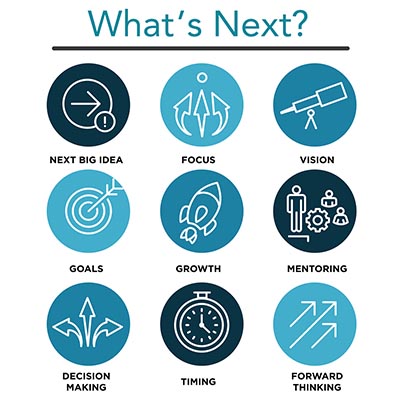
We make between 10,000 and 40,000 decisions each day according to Bob Posen of MIT. Of these, many are inconsequential and our choices rely more on habits than careful consideration of options. Coffee or juice? Train or taxi? But for decisions with more significant outcomes, such as those required during a divorce, it is best to develop an understanding of how we can improve our decision-making skills.
Understanding Decision Making
Simply deciding what to do for dinner after a long day at work can be a challenge. It is not surprising that we are able to weigh choices more effectively when rested and in a low-stress state of mind.
According to the Association for Psychological Science, “people pay more attention to the upside of a possible outcome” when under pressure to make big decisions. For example, when considering the positives and negatives of moving to a new home, one may weigh a desirable neighborhood more heavily than a longer commute.
There are also differences in decision making according to gender. Women generally tend to opt for lower-risk alternatives when making significant decisions. Men, when stressed, generally become more likely to take risks. Developing an awareness of your own personal decision-making style can help you make sure you are weighing all aspects of each choice with equal measure.
Take Care and Take Time
Taking care of yourself can positively influence your ability to make good choices. Getting plenty of sleep and leading a healthy lifestyle will help you stay at peak mental capacity for all decisions, including those associated with divorce. If you feel pressured to make a decision when under the influence of anger or fear, it is best to wait until you are in a more positive state of mind. For example, should you respond to a negative e-mail while you’re still hot under the collar? No. It can wait until morning. Other strategies that can help you regain your focus on positive outcomes include taking a walk, engaging yourself in a favorite activity, surrounding yourself with positive friends and family, and reaffirming your priorities.
Identify your Priorities
Make a list of your priorities when making and following through with a big decision, and this becomes most important when you’ve made the decision to divorce. If you have children, providing for their physical and emotional well-being will be at the top of the list. Consider what else is most important to you. You may realize that some of your most prized possessions – the bonds and relationships with close friends and family – can be strengthened during this time.
Once you have solidified what is most important, list the resources needed to make them possible. If providing a safe and nurturing household for your children is at the top of your list, what will it take to maintain that household? Begin by listing all of the known associated costs. You will be able to make more educated choices in developing your future budget.
Plan for the Future
Make a plan for where you would like to see yourself in five years. Listing your long-term goals makes it possible to break down big decisions into more manageable pieces. Keeping the future in mind also helps avoid the pitfalls that can occur when emotions override positive decision making. Emotional decision making tends to favor positive short-term outcomes over long-term benefits.
A coping mechanism in some divorces is the desire to have the process over with as quickly as possible. It is natural to want to avoid a lengthy or complicated divorce, but adopting the “I just want out” is often used as an excuse to avoid making decisions. That perspective can also prevent you reaching your future goals and desires, by shortchanging yourself today to just get “out.” Putting yourself in a positive state of mind and carefully considering your options is a much more beneficial way to steer yourself through the process. Remember: the proceedings of divorce are temporary. Ensure that the decisions you make now reflect your priorities and your plans for the future.
Understand your Options
Educate yourself and know what is possible and what is not. Divorce law varies from state to state, so the advice you got from your friend in Ohio or aunt in Florida may have little to do with your specific situation. Ensure your sources are current and specific to the state in which you reside. It is also important to keep in mind that your friend’s divorce results in the same state may not reflect what is appropriate in your case, and therefore looking to the divorce outcomes of friends may give you an unrealistic idea of the results you could obtain, whether positively or negatively.
While you should rely on an attorney for the interpreting the specific nuances of divorce law, it is a good idea to read up on the basics. The more informed you are of your choices, the better decisions you can make. In addition to explaining the law, your attorney can give you the statutory factors for custody or other relevant law to read and understand what will be applicable to you.
Develop your Team
Divorce is a team effort. Taking time at the beginning to consider your team will pay off down the road. Your choice of attorney should not just be someone familiar and experienced with the law; you must also feel comfortable communicating openly and asking questions. A financial consultant can provide a breakdown of the costs needed to support your current priorities as well as help you develop a long-term budget or financial plan for after divorce.
Your team should also include individuals who can help you maintain a positive outlook in your decision making. Close friends and family can provide emotional support. Reaching out to a therapist or counselor can also help you keep your lifestyle on a positive track.
For more information, or to talk about a pending separation, divorce, or family issues with one of Jacobs Berger’s licensed and experienced New Jersey matrimonial law attorneys, contact us to schedule your strategy session with our team.
Sources:
Heid, M. (2017, March 13). The Science-Backed Way to Make Better Decisions – Thrive … Retrieved June 18, 2017, from https://journal.thriveglobal.com/the-science-backed-way-to-make-better-decisions-32303812b41d
Mather, M. (2012, February 27). Stress Changes How People Make Decisions. Retrieved June 18, 2017, from https://www.psychologicalscience.org/news/releases/stress-changes-how-people-make-decisions.html#.WUbLisaQyUm






